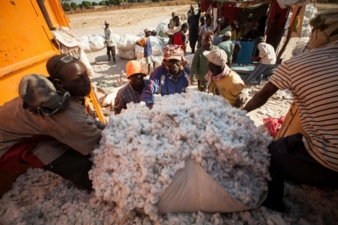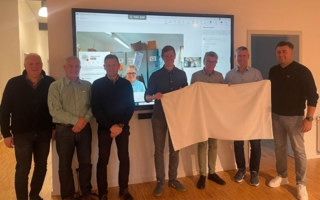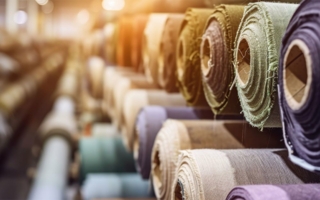22/08/2018 – Africa — auf Deutsch lesen
Fairtrade strengthens cotton growers
“Fairtrade means that small farmers can actually live off the hard work that they put in,” explains cotton farmer Titambé Diallo from Senegal, describing the Fairtrade approach from her own personal experience.
Being able to live off the income it generates should really be an essential condition of all work. Cotton growing in Africa, though, is a tough business.
Subsidised cotton from the USA and China keeps the price of African cotton so low that it is rarely possible to cover even the costs of production. Market speculation in the raw material also causes severe fluctuations in the price. In the growing regions themselves, African small farmers often have to battle against pest infestation, high fertiliser costs, depleted soils due to environmentally harmful use of pesticides, and the consequences of climate change-induced drought. The patches of land they have available are also often very small (less than a hectare). It is not an easy environment in which to battle for a livelihood. Fairtrade and other sustainability initiatives are firmly committed to supporting ecologically and fairly produced cotton in Africa and South-East Asia. In 2005, Fairtrade International introduced the Fairtrade Cotton standard to ensure that even small cotton producers had access for their crop yields to the worldwide trade in cotton.
A comprehensive solution
Fairtrade offers a comprehensive solution to allow African cotton growers to meet the challenges of the world market. This approach only works, though, if fairly grown cotton can also be sold under Fairtrade terms. Only then do the effects of the positive aspects of fair trade start to unfold. Although the volume of Fairtrade cotton sold from India has grown, demand for African Fairtrade cotton has shrunk. Fairtrade cotton growers from Senegal confirm this: “We’ve suffered setbacks – some seasons we’ve received no Fairtrade Premium because we simply couldn't sell our Fairtrade cotton. We had to sell it under normal sales terms.”
Read the complete article by Juliane Roux, Transfair e.V. in our printed issue textile network 9-10 2018 which appear on 30th August 2018.
You do not have a subscription? Please click HERE




